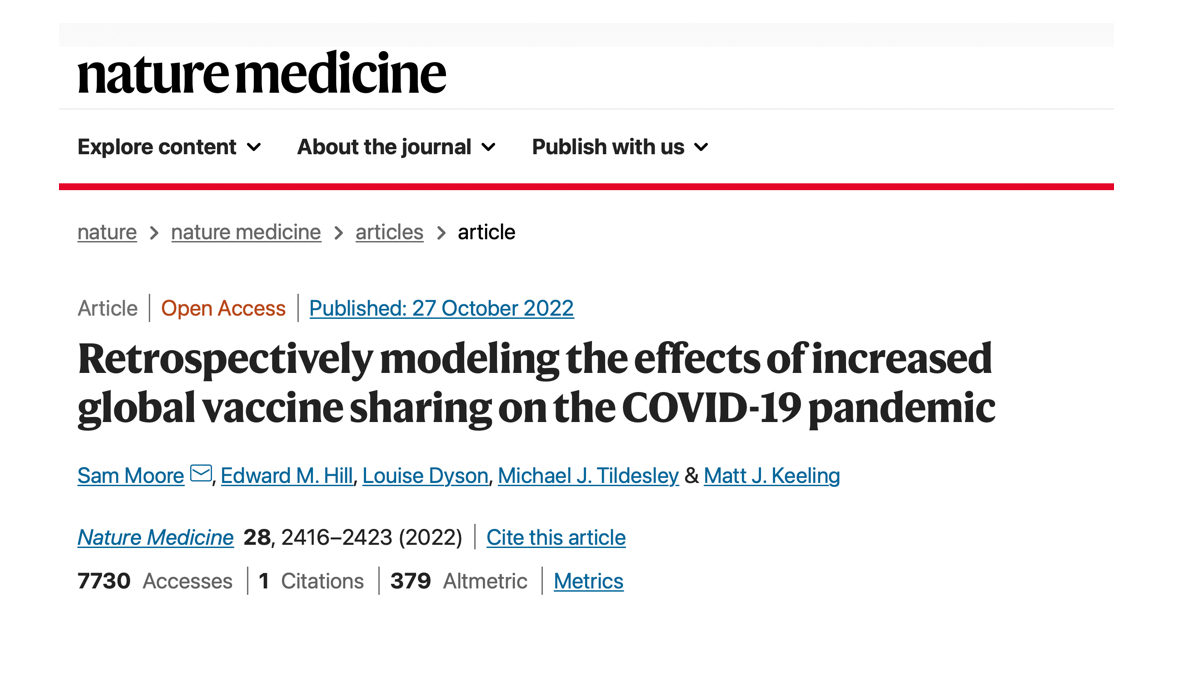Retrospectively modeling the effects of increased global vaccine sharing on the COVID-19 pandemic – NATURE
In total, we estimate that a full vaccine sharing scenario would have prevented 295.8 million infections and 1.3 million deaths worldwide (as a direct result of COVID-19) by the end of 2021 without any associated changes in behavior (Fig. 2k, Extended Data Fig. 1k and Supplementary Table 1).
Abstract. The severe acute respiratory syndrome coronavirus 2 (SARS-CoV-2) pandemic has caused considerable morbidity and mortality worldwide. The protection provided by vaccines and booster doses offered a method of mitigating severe clinical outcomes and mortality. However, by the end of 2021, the global distribution of vaccines was highly heterogeneous, with some countries gaining over 90% coverage in adults, whereas others reached less than 2%. In this study, we used an age-structured model of SARS-CoV-2 dynamics, matched to national data from 152 countries in 2021, to investigate the global impact of different potential vaccine sharing protocols that attempted to address this inequity. We quantified the effects of implemented vaccine rollout strategies on the spread of SARS-CoV-2, the subsequent global burden of disease and the emergence of novel variants. We found that greater vaccine sharing would have lowered the total global burden of disease, and any associated increases in infections in previously vaccine-rich countries could have been mitigated by reduced relaxation of non-pharmaceutical interventions. Our results reinforce the health message, pertinent to future pandemics, that vaccine distribution proportional to wealth, rather than to need, may be detrimental to all.
DOWNLOAD PDF FOR EDUCATIONAL PURPOSES
OPINION. THE NEW YORK TIMES. Why Isn’t the U.S. Embracing This Pandemic Prevention Strategy? Dec. 6, 2022
Vaccines can end pandemics. That’s why they are central to any plan to prepare for the next one.
“The only way to prepare the world for a pandemic outbreak is to regionalize production and access to medical countermeasures like vaccines,” said Rick Bright, a former director of the Department of Health and Human Services’ Biomedical Advanced Research and Development Authority, or BARDA.
Vaccine hoarding cost more than a million people their lives, according to a recent study in the journal Nature Medicine.
To avoid a repeat of this tragedy, every region of the world must be able to make its own vaccines. Right now, Africa, Latin America and parts of Southeast Asia rely primarily on imported vaccines.
Developing countries are attuned to this need after many waited nearly a year for ample Covid-19 vaccine supplies as wealthy countries enjoyed an extended period of first dibs. Americans, for example, were offered third doses of mRNA vaccines at a time when 98 percent of people in low-income countries had not received a single shot.

